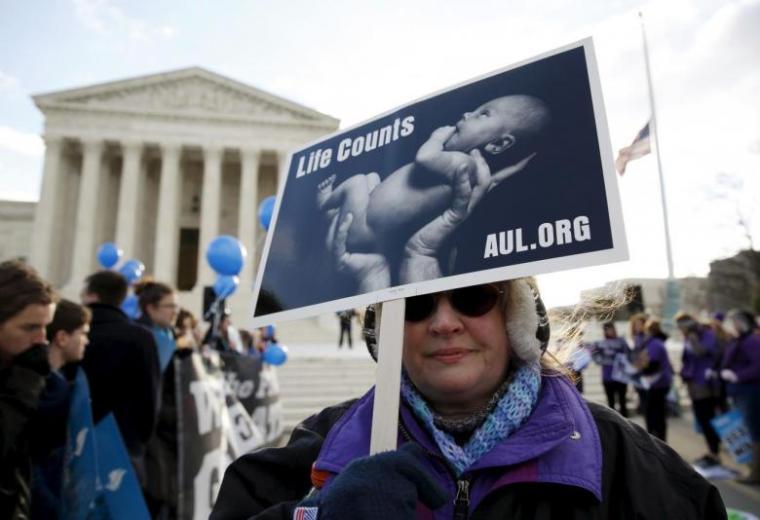Court upholds Tennessee constitutional amendment that denies abortion as a fundamental right

A federal appeals court has upheld the results of a 2014 statewide vote in Tennessee to keep an amendment to the state constitution that does not recognize abortion as a fundamental right.
Amendment 1, which states that "[n]othing in this Constitution secures or protects a right to abortion or requires the funding of an abortion," was approved by voters by a 53–47 percent margin in 2014.
Within days of its approval, eight voters, including a board chair of Planned Parenthood of Middle and East Tennessee, filed a lawsuit challenging the outcome, claiming that the way the state counts ballots is unconstitutional.
The passage of Amendment 1 required a majority of the number of votes cast for the governor, which had been obtained. However, opponents claimed that voters had to cast ballots in both the governor's race and on the amendment to have their votes counted. Some have claimed that the vote was "diluted" because some voters abstained from voting for a governor while casting ballots on the amendment.
On April 21, 2016, Circuit Court Judge Michael Binkley upheld the outcome saying the language for how the votes for amendments should be counted is "unambiguous."
The Sixth Circuit Court of Appeals upheld the lower court decision on Tuesday, arguing that the state's method "was the correct interpretation of vote counting methods and that election officials vote counting methods were 'reasonable and true.'"
Brian Harris, president of Tennessee Right to Life, described the ruling as "a vindication of the state's amendment process and victory for thousands of pro-life Tennesseans who sacrificed to see Amendment 1 passed."
"We are grateful to the legislators who placed the amendment on the ballot, to voters who approved it, and to the Attorney General, Secretary of State, and Coordinator of Elections who all worked tirelessly to defend it," Harris said.
According to the Baptist Press, the amendment allowed the state legislators to enact restrictions on abortions that are already being implemented in neighboring states. One of the measures introduced by lawmakers since the vote was a 48-hour waiting period for women seeking abortions, which was signed into law by the governor in 2015.
The vote on Amendment 1 follows the decision by the Tennessee Supreme Court in 2000 which declared a "fundamental right to abortion" in the Tennessee Constitution, which made the enforcement of abortion restrictions impossible in the state.
Tennessee has been ranked third in the nation in the number of out-of-state abortions and has been branded as an "abortion destination" due to the lack of restrictions prior to the vote on Amendment 1. The vote has been described by The Tennessean as the "most hotly contested and most expensive Tennessee ballot measure in recent year."
 Christians don't have to affirm transgenderism, but they can’t express that view at work: tribunal
Christians don't have to affirm transgenderism, but they can’t express that view at work: tribunal Archaeology discovery: Medieval Christian prayer beads found on Holy Island
Archaeology discovery: Medieval Christian prayer beads found on Holy Island Presbyterian Church in America votes to leave National Association of Evangelicals
Presbyterian Church in America votes to leave National Association of Evangelicals Over 50 killed in 'vile and satanic' attack at Nigerian church on Pentecost Sunday
Over 50 killed in 'vile and satanic' attack at Nigerian church on Pentecost Sunday Ukrainian Orthodox Church severs ties with Moscow over Patriarch Kirill's support for Putin's war
Ukrainian Orthodox Church severs ties with Moscow over Patriarch Kirill's support for Putin's war Islamic State kills 20 Nigerian Christians as revenge for US airstrike
Islamic State kills 20 Nigerian Christians as revenge for US airstrike Man who served 33 years in prison for murder leads inmates to Christ
Man who served 33 years in prison for murder leads inmates to Christ


 Nigerian student beaten to death, body burned over ‘blasphemous’ WhatsApp message
Nigerian student beaten to death, body burned over ‘blasphemous’ WhatsApp message 'A new low': World reacts after Hong Kong arrests 90-year-old Cardinal Joseph Zen
'A new low': World reacts after Hong Kong arrests 90-year-old Cardinal Joseph Zen Iran sentences Christian man to 10 years in prison for hosting house church worship gathering
Iran sentences Christian man to 10 years in prison for hosting house church worship gathering French Guyana: Pastor shot dead, church set on fire after meeting delegation of Evangelicals
French Guyana: Pastor shot dead, church set on fire after meeting delegation of Evangelicals ‘Talking Jesus’ report finds only 6% of UK adults identify as practicing Christians
‘Talking Jesus’ report finds only 6% of UK adults identify as practicing Christians Mission Eurasia ministry center blown up in Ukraine, hundreds of Bibles destroyed: 'God will provide'
Mission Eurasia ministry center blown up in Ukraine, hundreds of Bibles destroyed: 'God will provide' Church holds service for first time after ISIS desecrated it 8 years ago
Church holds service for first time after ISIS desecrated it 8 years ago Burger King apologizes for 'offensive campaign' using Jesus' words at the Last Supper
Burger King apologizes for 'offensive campaign' using Jesus' words at the Last Supper Uganda: Muslims abduct teacher, burn him inside mosque for praying in Christ’s name
Uganda: Muslims abduct teacher, burn him inside mosque for praying in Christ’s name